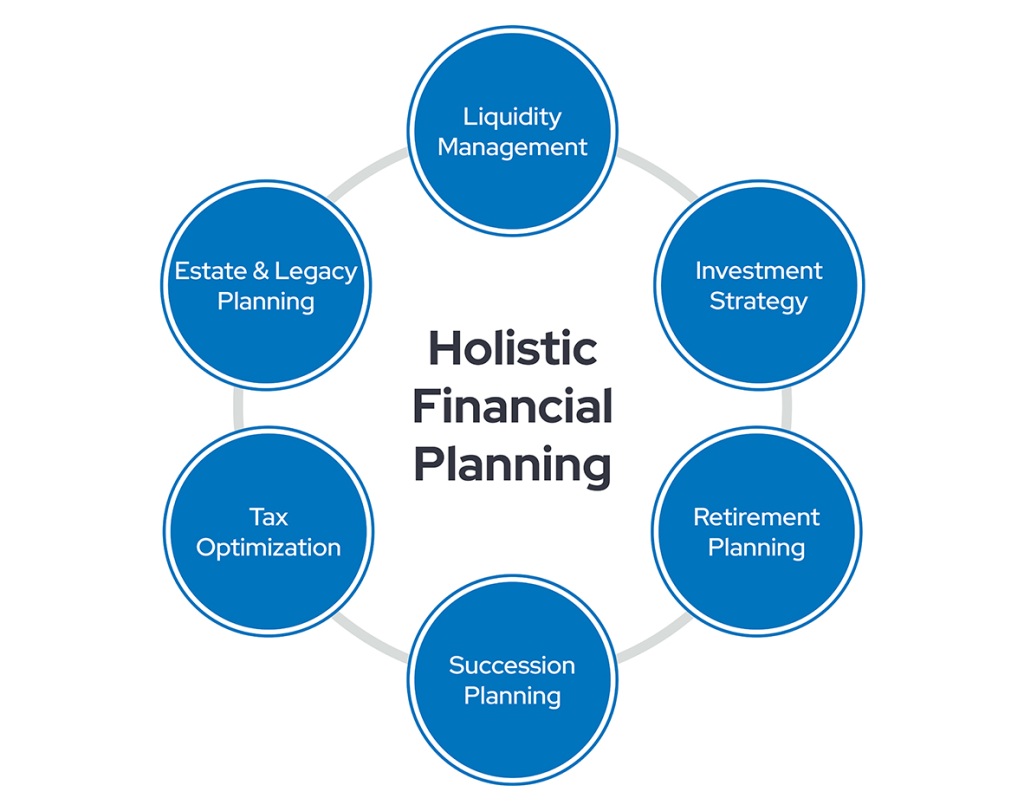Traditional financial planning has long focused on helping investors meet one financial goal at a time, aligned with specific life stages. While goal-setting is one part of financial planning, it isn’t the only way. Taking a holistic approach and addressing how a client’s values, goals and experiences fit together as a full picture can lead to a more unified plan and a more meaningful advisor-client relationship.
Holistic financial planning recognizes that every financial decision impacts others, and works to integrate all aspects of client’s life into a comprehensive strategy for more informed decision-making.
More than just serving clients, holistic financial planning is a foundation for deepening relationships, increasing retention, and driving sustainable practice growth.
financial planning noun The activity or process of making decisions about managing one's finances, which includes budgeting, saving, investing, and planning for goals like retirement or college.
holistic financial planning noun A big picture approach that integrates all aspects of an individual’s life, including their values, goals, and experiences, into a comprehensive, coordinated financial strategy.
What does a holistic approach to financial planning look like?
Traditional financial planning often zeroes in on asset allocation and performance, overlooking the broader context of a client's financial life. For example, an advisor might structure a portfolio for maximum growth, without realizing the client wants to help their adult children buy homes, or support aging parents—both of which require different liquidity and risk considerations.
Holistic financial planners take a top down approach, starting with what matters most: a client’s values, lifestyle, and vision for the future. From there, they integrate investment management, tax planning, estate planning, and risk management into one cohesive plan. This comprehensive view becomes especially critical with financial planning for high-net-worth individuals, where complex considerations like multi-generational wealth transfer, philanthropic legacy, business succession, and sophisticated tax strategies can't be handled in isolation.
The difference is in the planning process itself.
Instead of asking "How can we maximize portfolio returns?" holistic planning asks "What does this client want their money to accomplish over their lifetime—and beyond?" It views a financial life as a dynamic system where decisions in one area affect the whole plan. This long-term, integrated perspective helps financial advisors anticipate challenges, identify opportunities, and deliver advice that's more closely aligned with what clients want to achieve.
How holistic planning sets advisors apart
Holistic planning transforms the advisor-client relationship by demonstrating that you understand not just your clients' portfolios, but their lives. Research from Russell Investments shows that 8 in 10 clients would be more confident (77%), more likely to keep (78%), and more willing to refer (81%) an advisor who communicates more often and more personally.1
When advisors use a holistic lens, they're naturally positioned to have those deeper, more meaningful conversations about family dynamics, legacy aspirations, philanthropic values, and life transitions. This can make all the difference for affluent investors and their families dealing with complex, interconnected financial considerations.
Adopting a holistic approach can help advisors:
Offer more personalization
Holistic financial planners customize recommendations to reflect on how clients want to live, what they want to protect, and what legacy they want to leave. This level of personalization goes beyond investment returns to include retirement planning, tax planning, estate planning, and life planning.
Increase client retention
93% of clients are more likely to stay with firms offering tools that provide a complete view of their finances.2 The comprehensive nature of holistic financial planning creates natural stickiness, because replacing you would mean rebuilding that integrated strategy from scratch.
Add additional services and revenue
Holistic financial planning creates opportunities beyond investment management, such as estate planning coordination, tax strategy, and charitable giving advice. Delivering these services demonstrates the comprehensive value advisors offer, which is why financial advisors charge for financial planning as part of a broader wealth management offering.
Build trust with successors
Studies show that around 90% of most children and heirs will leave their parents' advisor upon receiving their inheritance.3 But advisors can take steps to engage the next generation by involving them in family wealth conversations and demonstrating their value across multiple dimensions of financial life. Advisors who take a deliberate, structured approach are better positioned to create meaningful connections with heirs and position themselves as trusted advisors for the entire family.
Components of a holistic financial plan

A holistic approach to financial planning integrates multiple strategies and coordinates seamlessly with CPAs, attorneys, and family offices to address every dimension of a client's wealth. Advisors who can orchestrate this comprehensive array of services and guidance, rather than focusing solely on investments, can become the central hub that high-net-worth clients rely on for all their financial decisions.
To incorporate financial planning into your wealth management practice, consider how these core components work together to create a truly integrated plan:
Cash flow & liquidity management
Managing cash flows means balancing income, investments, and lifestyle aspirations. Effective liquidity management ensures clients can access funds when they need it, without disrupting long-term strategies.
Investment strategy
Holistic investment management coordinates diversified portfolios across asset classes, accounts, and generations. The goal is to align strategies with client's broader financial picture, tax considerations, and risk tolerance.
Retirement & succession planning
Retirement planning addresses short and long term needs, from ensuring lifestyle continuity in early retirement to planning healthcare costs and legacy goals. For business owners, it includes succession planning to ensure smooth leadership transitions and tax impact.
Tax optimization
Strategic tax planning with a solution like Envestnet Tax Overlay is essential for preserving wealth, whether it’s managing annual tax exposure or coordinating multi-year strategies around capital gains, charitable giving, and income timing.
Estate & legacy planning
Estate planning is life planning that ensures wealth transfers to heirs or charitable causes efficiently and meaningfully. Advisors coordinate with estate attorneys to structure trusts and minimize tax burdens while preserving family harmony.
Incorporate holistic financial planning with high-net-worth clients
Delivering holistic financial planning to high-net-worth clients requires a structured yet flexible framework that can adapt to their complex needs. Here's how to demonstrate your value at every stage:
- Client discovery: Ask open-ended questions that go beyond numbers to help you understand what truly matters to your clients—from retirement aspirations and family dynamics to philanthropic passions, business ambitions, and legacy plans.
- Information gathering: Some information is easily gathered in an online form, while other details are better collected as part of an in-person conversation, where you benefit from a longer answer and the ability to ask follow-up questions.
- Analysis and development: With a complete picture in hand, analyze how all the pieces work together. Identify tax inefficiencies, insurance gaps, estate planning misalignments, or liquidity conflicts. Present your analysis in terms of progress toward their life goals, not just technical improvements.
- Implementation: Use financial planning technology like MoneyGuide to model scenarios, stress-test strategies, and real time impact. Technology also enables you to scale holistic planning across your client base without sacrificing personalization.
- Ongoing collaboration: Holistic planning is continuous. Schedule regular reviews, re-address assumptions, and adjust strategies to life changes. Proactively reach out when tax law changes, the market shifts, or life events create new planning opportunities. Consistent communication reinforces your role as the central coordinator of your client's financial life.
“The holistic financial plan is something we hear a lot… it’s the perfect way to understand how planning and wealth management and the whole thing is really regarded by consumers, too. They're expecting a lot more from an advisor than just a money manager. They're expecting something that’s seamless and frictionless.” 4
Dana D'Auria, CFA, Co-Chief Investment Officer and Group President, Envestnet Solutions
Adaptive wealthtech to power your financial practice
Financial advisors can bring different pieces of a client’s financial puzzle together in multiple ways. By coordinating all these elements, the holistic advisor can help their clients gain more from a sale, protect their wealth, and help them achieve their retirement and legacy goals—all while positioning themselves as indispensable through the process.
Holistic planning demands more time, and that’s why the right wealth management technology is so critical. From comprehensive financial planning tools like MoneyGuide, to Unified Managed Accounts (UMAs) that coordinate complex investment strategies, to private wealth solutions for high-net-worth clients, Envestnet’s adaptive wealthtech can help streamline time-consuming processes, uncover what clients care about, and make it possible to deliver personalized service at scale.
It’s how we help advisors put the holistic in financial planning.
Learn more about Envestnet’s adaptive wealthtech and how it empowers advisors to deliver holistic financial planning at scale.
